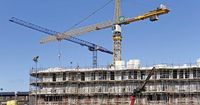The recent decision to freeze rent increases for social housing in the Netherlands has sparked significant controversy among housing corporations and tenant advocacy groups. According to the Spring Memorandum, the previously planned 5 percent rent increase for social housing will not be implemented for the years 2025 and 2026. This announcement has left the housing sector in disarray, with Aedes, the umbrella organization for housing corporations, expressing its dismay and labeling the government coalition as 'unreliable.'
Aedes' reaction comes as a stark reminder of the challenges facing the housing market. The freeze on rent increases is expected to severely impact the investment capacity of housing corporations, potentially leading to the cancellation of the construction of at least 90,000 new homes. Aedes chair Liesbeth Spies voiced her concerns, stating, "I understand that 'lower rents' sounds sympathetic, but it has a dark side." She warned that reduced rental income would limit the ability of corporations to borrow and invest in sustainability and new housing projects.
The decision to freeze rents follows a tumultuous period in which agreements regarding rent increases were made only four months prior. These agreements allowed for a 4.5 percent increase in the social sector, a 7.7 percent increase in the mid-rental sector, and a 4.1 percent increase in the free sector. However, the coalition's recent move to halt the increase in the social housing sector has raised questions about its commitment to solving the ongoing housing crisis.
In 2023, housing corporations managed to add only about 8,000 new homes, a figure that falls significantly short of their targets. Aedes fears that the ambitions for increased social housing construction will further diminish if the House of Representatives adopts the proposal to freeze rents. With the coalition's decision, the hope of building 30,000 social rental homes annually from 2027 is now in jeopardy.
The Woonbond, a tenant advocacy organization, has hailed the rent freeze as a 'great success for tenants.' They argue that the freeze will prevent a rent explosion that would have further strained the finances of social housing tenants. However, the Woonbond also emphasizes the need for a reduction in the tax burden on housing corporations to enable them to build enough social rental homes.
Moreover, the freeze on social rent increases does not apply to the mid-rental and free sectors, where rents are still permitted to rise by 7.7 percent and 4.1 percent, respectively. This disparity has raised concerns among tenant advocates, who fear that the lack of rent protections in the private rental market could lead to significant financial strain on tenants.
In response to the housing crisis, Minister of Housing Mona Keijzer has proposed measures to accommodate private landlords, which could potentially lead to more rental homes being available without rent price protections. This move has been met with skepticism by many, including Aedes, who worry that such changes could exacerbate the already challenging conditions for tenants.
The coalition appears to be divided on the issue, with some members supporting Keijzer's proposals while others express concerns about the implications for tenants. VVD leader Dilan Yesilgöz recently indicated on social media that the Affordable Rent Act would be 'significantly relaxed,' allowing for fewer rental homes to fall under the law and making exceptions for small landlords. This shift in policy could undermine the protections that were established to prevent excessive rent increases in the private market.
As the situation develops, Aedes has signaled its intention to challenge the government's decision legally. They argue that the recent changes effectively nullify the agreements made just months ago during the Housing Summit, leaving housing corporations in a precarious position. Spies questioned how serious the government could be about addressing the housing crisis when it disregards previously established agreements.
The debate over rent increases and housing availability highlights the complex dynamics at play in the Dutch housing market. While the freeze on social housing rents aims to support lower-income households, it simultaneously raises critical questions about the future of housing development and sustainability.
Looking ahead, both Aedes and the Woonbond agree that a balanced approach is necessary to ensure that the needs of tenants are met while also enabling housing corporations to invest in new construction and sustainability efforts. The Woonbond has called for discussions with Minister Keijzer to establish a moderate rent policy for all sectors over the coming years.
In conclusion, the freeze on social housing rents has ignited a heated debate in the Netherlands, revealing the tensions between government policy, tenant rights, and the financial viability of housing corporations. As stakeholders navigate this complex landscape, the future of social housing and tenant protections remains uncertain.








